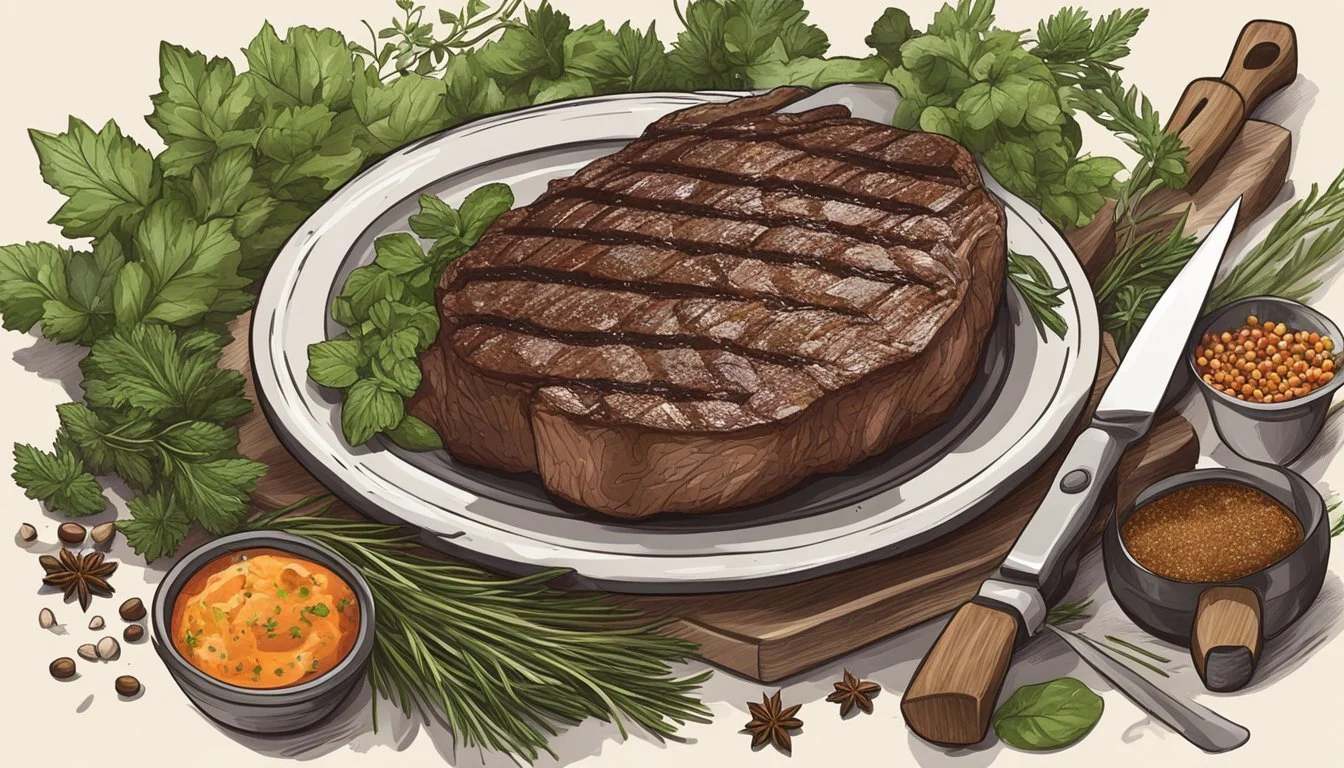10 Carnivore Diet-Friendly Foods to Always Have on Hand
Essential Staples for Every Meal
The carnivore diet focuses exclusively on animal-based foods to streamline nutrition and simplify dietary choices. Many find this approach beneficial for health, energy, and weight management. Choosing the right foods ensures a balanced intake of essential nutrients necessary for those following a carnivore lifestyle.
Increasing adherence to the carnivore ethos means ensuring that specific staples are available. These foods not only provide adequate nutrition but also help maintain variety and satisfaction in meals. By having a well-stocked pantry and fridge, one can seamlessly integrate this diet into daily life.
1) Grass-Fed Ribeye Steak
Grass-fed ribeye steak is a staple for anyone following the carnivore diet. It offers a rich, natural flavor that comes from cows raised on a diet of grass, making it leaner compared to grain-fed beef. This choice supports a cleaner eating habit, aligning with the carnivore diet's principles.
The nutritional profile of grass-fed ribeye steak includes higher levels of omega-3 fatty acids and conjugated linoleic acid (CLA), both of which have been associated with various health benefits. These nutrients contribute to reducing inflammation and supporting heart health.
Selecting a quality grass-fed ribeye ensures a robust source of high-quality protein. This is essential for muscle maintenance and overall vitality. Its marbling also provides ample fat, offering a steady energy source for those on a low-carb diet.
Preparing grass-fed ribeye can be straightforward and satisfying. Simple seasoning with salt and pepper, followed by grilling or pan-searing, allows its natural flavors to shine. Letting the steak rest at room temperature before cooking enhances its tenderness.
Having grass-fed ribeye steak on hand ensures that you always have a nutritious, carnivore-friendly option readily available. This makes it easier to stay committed to your dietary goals without compromising on taste or nutrition.
2) Wild Caught Salmon
Wild-caught salmon is a nutrient powerhouse, perfect for the carnivore diet. Rich in high-quality protein, it offers essential amino acids necessary for muscle repair and growth. Unlike farmed salmon, it is less likely to contain harmful contaminants and more likely to be free from antibiotics.
One of the key benefits of wild-caught salmon is its omega-3 fatty acid content. These healthy fats are known for their anti-inflammatory properties and support cardiovascular health. Incorporating these fats helps manage inflammation and can improve heart health in carnivore diet followers.
In addition to protein and omega-3s, wild-caught salmon is a great source of B vitamins, including B12, which is essential for red blood cell production and neural function. It also contains selenium and phosphorus, contributing to overall metabolic function and bone health.
For those following a carnivore diet, adding wild-caught salmon ensures they receive a variety of nutrients that might otherwise be missing. The diverse nutrient profile of wild-caught salmon makes it an excellent addition to meal planning.
3) Chicken Thighs
Chicken thighs are a staple for anyone on a carnivore diet. They are rich in protein and contain more fat than chicken breasts, which makes them both flavorful and satisfying.
These thighs can be cooked in various ways. One popular method involves searing the thighs in a skillet and then transferring them to a preheated oven to finish cooking. This technique ensures the skin becomes crispy while keeping the meat juicy.
Rub the chicken thighs with salt and your favorite seasonings like pepper, garlic powder, or paprika. Cook them in olive oil or butter for added flavor and richness. Roasting them at moderate temperatures, such as 375°F (190°C), and letting them rest post-cooking will keep the meat tender and moist.
For a simpler approach, bake seasoned thighs in the oven at 250°F (120°C) before increasing the temperature to brown the skin. The versatility and rich taste of chicken thighs make them perfect for any meal on a carnivore diet.
4) Bison Burgers
Bison burgers are a valuable addition to the carnivore diet due to their high protein content and lean nature.
Bison meat supports muscle growth and repair, making it suitable for those seeking to maintain or build muscle. The lower fat content in bison compared to beef also makes it a healthier option while still providing essential nutrients.
These burgers can contribute to satiety and help reduce cravings, which is beneficial for those aiming at weight management. Bison meat also offers a rich, slightly sweet flavor that can be more appealing than traditional beef.
Preparing bison burgers is straightforward. Mix ground bison meat with simple seasonings such as salt, pepper, and garlic. Form the mixture into patties about three-quarters to one-inch thick.
Grill the patties for about 2-4 minutes on each side, depending on the desired level of doneness. Pair with zero-carb buns if desired, or simply enjoy the patties on their own.
Including bison burgers in a carnivore diet can add variety, preventing monotony with meal choices. Bison's rich nutrient profile and appealing taste make it an excellent choice for anyone on the carnivore plan.
5) Pork Belly
Pork belly serves as a versatile and nutrient-rich option on the carnivore diet. This savory cut of meat is known for its tender texture and rich flavor. It is an excellent source of protein and essential vitamins and minerals, including niacin, vitamin B6, and magnesium.
When preparing pork belly, the cooking methods are key to achieving optimal taste and texture. Roasting it at a high temperature initially helps to render the fat and create a crispy exterior. Following this, a lower temperature allows the meat to become tender and juicy.
Pork belly also aligns well with the principles of the carnivore diet by providing a high-fat content, which is essential for energy. Its fat content makes it satisfying and helps maintain energy levels throughout the day.
In addition to being a nutrient powerhouse, pork belly can be easily incorporated into various meals. Whether roasted, grilled, or slow-cooked, it offers flexibility in meal preparation.
Including pork belly in the diet ensures a delicious and nutrient-dense food source, supporting the dietary needs of those following a carnivore lifestyle.
6) Duck Breast
Duck breast is a versatile and flavorful option for carnivore diet followers. Rich in protein, it provides essential nutrients that support muscle growth and repair.
When prepared with the skin on, duck breast delivers an excellent source of healthy fats. These fats contribute to satiety and provide a steady energy source.
Duck breast can be cooked in various ways, such as roasting, grilling, or pan-searing. Each method enhances its natural, robust flavor.
In addition to its culinary benefits, duck breast is high in vitamins and minerals. It contains iron, which aids in red blood cell production, and selenium, known for its antioxidant properties.
This meat can be incorporated into different meals, from simple dinners to more elaborate dishes. Its distinct taste can elevate any carnivore diet plan, ensuring that meals remain both nutritious and enjoyable.
7) Lamb Chops
Lamb chops are a staple for anyone following a carnivore diet. They offer a rich source of high-quality protein, approximately 25 grams per 100 grams serving. This makes them excellent for muscle growth and maintenance.
These chops are also rich in essential minerals. For instance, iron plays a crucial role in oxygen transport in the blood. Zinc supports immune function and wound healing, while phosphorus helps maintain bone health.
In terms of fat content, lamb chops provide around 15 grams per 100 grams serving. This aids in providing the energy necessary for those on a low-carb diet. The fat can also add flavor and juiciness to the meat when cooked.
Lamb chops can be grilled to perfection. Cooking them to an internal temperature of 145°F for medium-rare or 160°F for medium ensures both safety and optimal taste. Using a meat thermometer can help achieve this.
The versatility of lamb chops makes them a favorite. They can be prepared simply with salt or paired with various herbs and spices for added flavor. This flexibility allows for a wide range of meal options suitable for any occasion.
8) Turkey Breast
Turkey breast is a staple for those following a carnivore diet.
It's a lean source of protein, providing essential nutrients without excess fat. This is ideal for anyone looking to maintain muscle mass and support overall health.
Turkey breast can be easily prepared by grilling, baking, or pan-searing. Its mild flavor pairs well with various herbs and spices, making it a versatile addition to any meal plan.
In addition to being protein-rich, turkey breast is low in carbohydrates, making it suitable for strict carnivore regimens. It can be sliced for salads, used in sandwiches, or served as a main dish.
Including turkey breast in your diet ensures a tasty, healthy option that aligns with carnivore diet principles.
9) Venison Steaks
Venison steaks are an excellent choice for anyone following a carnivore diet. They offer a rich flavor and high protein content. With zero carbohydrates, they fit perfectly into strict dietary guidelines.
To prepare venison steaks, begin by seasoning them with salt and black pepper. For an enhanced flavor, marinate the steaks for a few hours. Popular marinades include buttermilk or a simple blend of garlic, herbs, and oil.
When cooking venison steaks, it's important not to overcook them. Aim for a medium-rare to medium doneness. This will ensure the steaks remain juicy and tender. Use a meat thermometer to check the internal temperature, which should reach 135°F for medium-rare.
Venison pairs well with herbs like rosemary and thyme. For a satisfying meal, consider serving venison steaks with a side of cooked vegetables or a fresh salad. Venison's unique taste and nutritional benefits make it a valuable addition to a carnivore diet.
10) Beef Liver
Beef liver is a staple in the carnivore diet due to its high nutrient density. It is rich in essential vitamins and minerals like vitamin A, B vitamins, iron, and zinc. These nutrients are vital for various bodily functions, including immune system support and energy metabolism.
Cooking beef liver can be straightforward. It can be sautéed or pan-fried in butter or animal fat. Many people prefer to slice the liver thinly, about 0.5 cm, for quick and even cooking. Heating the pan until very hot before adding the fat and liver ensures a good sear and enhances flavor.
Another popular method is baking. Liver slices, roughly 1 inch thick, can be wrapped in bacon and secured with a toothpick. Baking at 400 degrees Fahrenheit for about 10 minutes results in a crispy texture. Adding sea salt enhances the taste.
For those who enjoy a spreadable option, liver pâté is a nutrient-dense choice. It aligns with the carnivore ethos of maximizing nutrient intake from animal sources. Organ meats like liver are often referred to as superfoods due to their high vitamin and mineral content.
Understanding the Carnivore Diet
The Carnivore Diet focuses exclusively on animal-based foods, emphasizing high-quality meats, seafood, and certain dairy products. It is aimed at optimizing nutrient intake from animal sources.
Principles of the Carnivore Diet
The Carnivore Diet involves consuming only animal products. Foods included are meat, seafood, eggs, and some dairy. Meals often consist of beef, pork, chicken, fish, and organ meats. Dairy products like cheese and butter are also commonly consumed.
The diet strictly excludes plant-based foods such as vegetables, fruits, grains, and legumes. The goal is to provide the body with essential nutrients from protein and fat. High-fat meats are encouraged for their energy yield and nutrient density. Key to the diet is the simplicity of food choices and meal preparation.
Health Benefits and Risks
The Carnivore Diet may offer several health benefits. Some proponents claim it can lead to better joint health, improved immune function, and more stable energy levels throughout the day. It may also support heart health and skin vitality.
However, it is not without risks. The exclusion of plant-based foods can lead to deficiencies in vitamins like Vitamin C and certain fibers. There is also concern about the long-term impact on heart and digestive health due to high intake of saturated fats and lack of dietary fiber.
Consulting with a healthcare professional before starting the diet is recommended to weigh potential benefits and risks based on individual health needs.
Essential Nutrients on the Carnivore Diet
On a carnivore diet, ensuring an adequate intake of essential nutrients is crucial. These nutrients primarily come from animal-based foods, which are rich sources of proteins, fats, vitamins, and minerals.
Macronutrients: Protein and Fat
Protein and fat are the primary macronutrients on the carnivore diet. Protein is vital for muscle maintenance, enzyme production, and overall bodily function. Key sources include beef, pork, chicken, and fish. It's important to consume a variety of animal proteins to get a full amino acid profile.
Fat plays a significant role in energy provision and the absorption of fat-soluble vitamins (A, D, E, and K). Animal fats from sources like fatty fish, beef, lamb, pork, and butter are all excellent choices. Grass-fed meats and dairy are particularly beneficial due to their higher content of omega-3 fatty acids and conjugated linoleic acid (CLA).
Micronutrients: Vitamins and Minerals
Animal-based foods provide essential vitamins and minerals that are critical for health. Liver and other organ meats are rich in vitamins A, B12, and folate. Fatty fish like salmon and mackerel are excellent sources of vitamin D and omega-3 fatty acids.
Minerals such as zinc, iron, and magnesium are abundant in red meats and shellfish. Red meats, particularly beef and lamb, provide bioavailable heme iron, which is more easily absorbed by the body compared to non-heme iron from plant sources. Bone broth is a versatile addition, supplying calcium, phosphorus, and collagen, which support joint and bone health.







